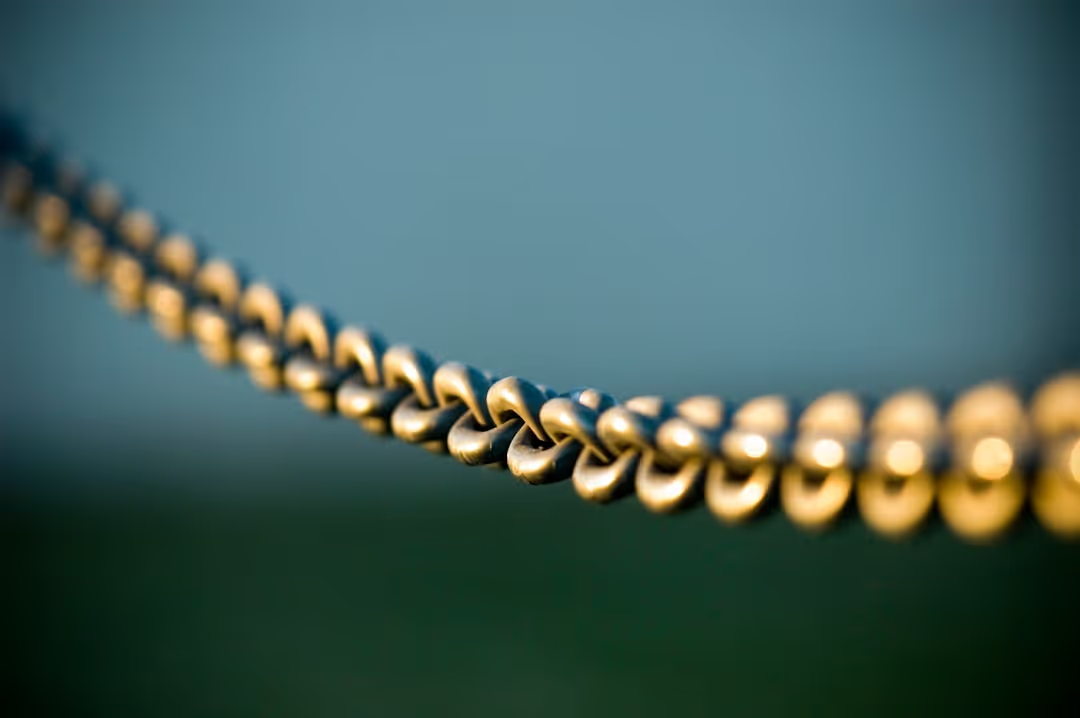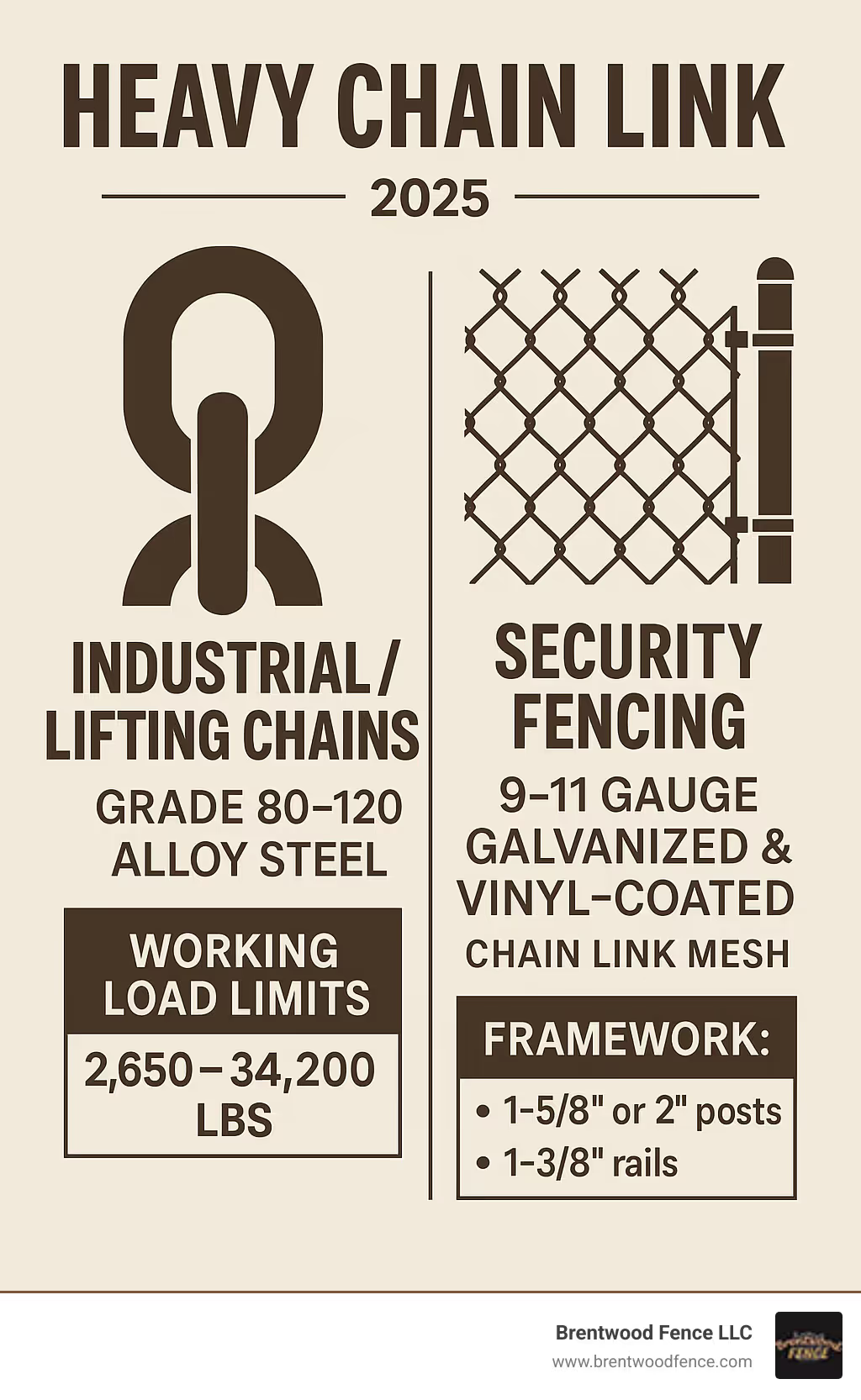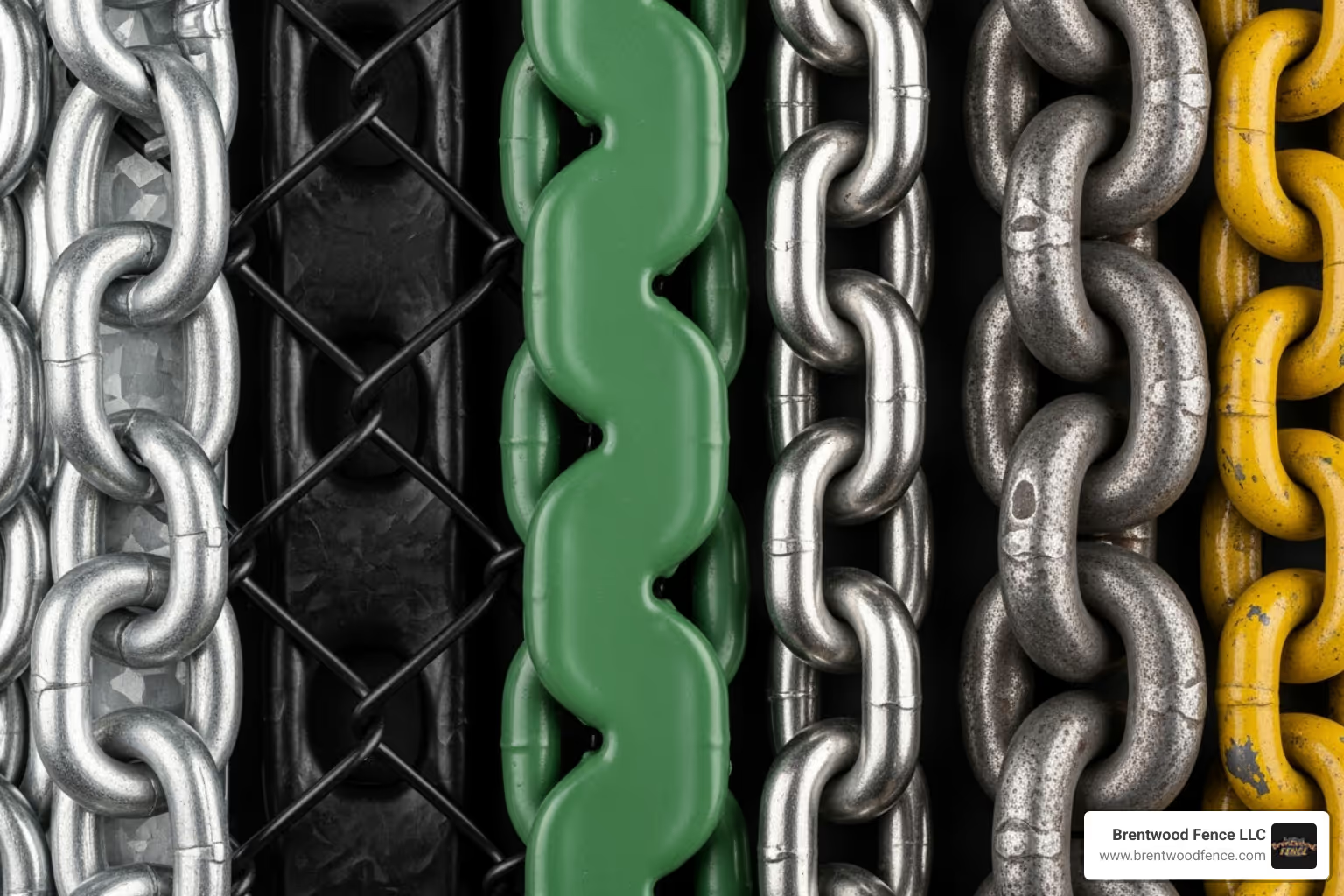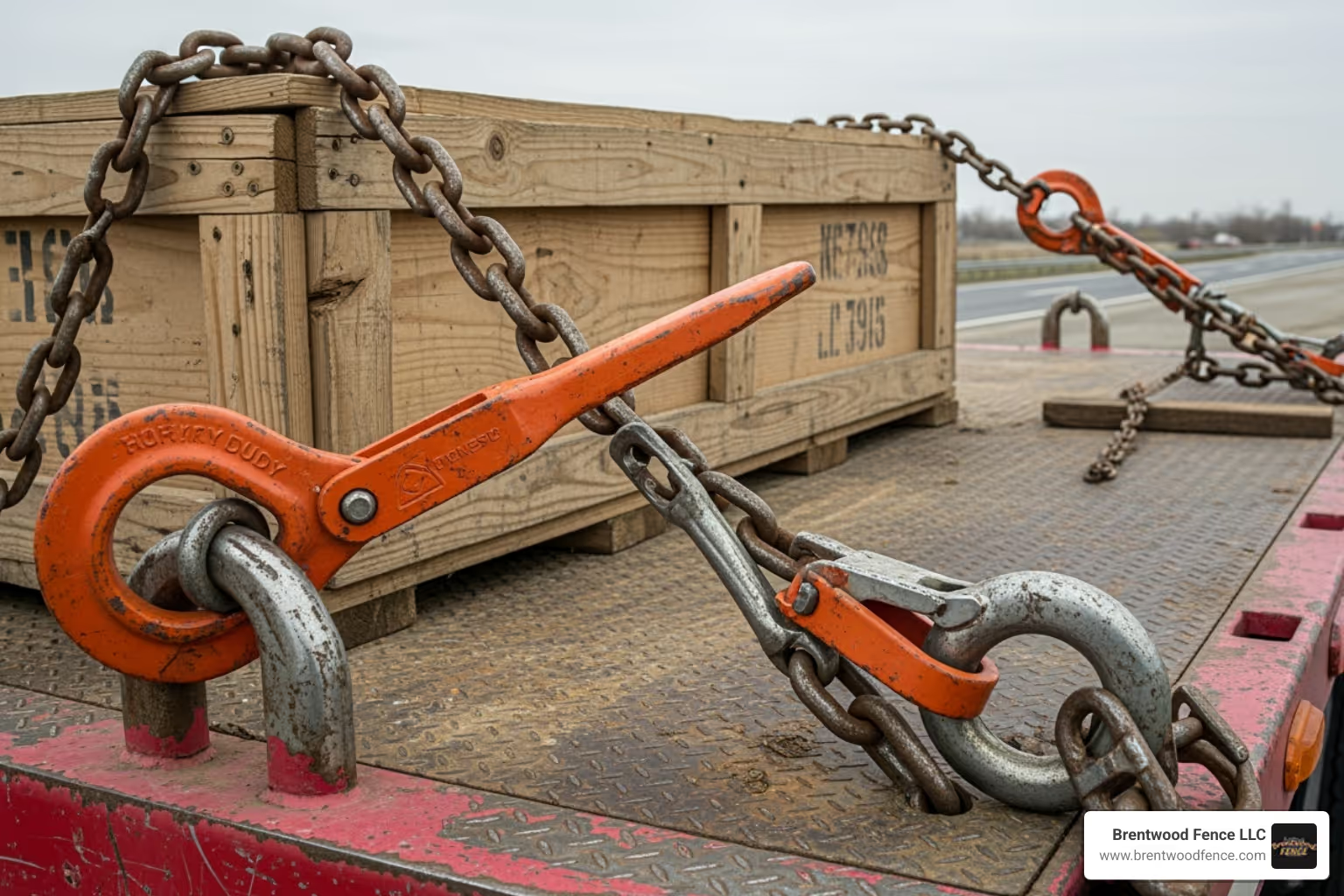Blog Content
9
Aug
2025

When you need heavy chain link for uncompromising strength and security, it's crucial to understand the two main categories: industrial-grade chains for lifting and towing, and heavy-duty fencing for property protection.
Quick Answer: Heavy Chain Link Options
The difference comes down to material strength and manufacturing. Industrial chains use quenched and tempered alloy steel with specific grade ratings, while heavy chain link fencing relies on thicker wire gauges and reinforced framework.
As industry experts emphasize, "Only Grades 80, 100, or 120 should be used for overhead lifting," a critical safety distinction. The same principle applies to security fencing, where wire gauge and coating quality determine long-term performance.
At Brentwood Fence LLC, we've seen how the right heavy chain link fencing solution transforms security and peace of mind for property owners across New Hampshire, Massachusetts, and Maine.

Quick heavy chain link terms:
When you hear heavy chain link, you might picture any sturdy-looking chain or fence. But true heavy chain link products are precision-engineered for extreme conditions, whether lifting massive loads or protecting a high-security facility. What makes these products "heavy" isn't just their weight—it's their ability to handle forces that would destroy ordinary chains and fencing. This superior performance comes from carefully selected materials like carbon steel and alloy steel, combined with advanced manufacturing processes.

Industrial heavy chain link is where engineering meets brute strength, built for jobs where failure could be catastrophic. The strength of these chains is measured by grades—Grade 80, Grade 100, and Grade 120 represent specific alloy compositions and heat treatments that determine their load capacity. More about Grade 80 Chain specifications shows how precise these standards are.
Every industrial chain has a Working Load Limit (WLL), the maximum safe lifting weight, and a Breaking Load, the point of failure. Most chains follow a 4:1 safety ratio, meaning they break at four times their WLL. The manufacturing process involves quenched and tempered heat treatments and proof testing every link to loads higher than its WLL, ensuring it meets strict NACM standards.
Heavy chain link fencing takes a different approach to strength, designed to stand firm against weather and intruders. The "heavy" designation comes from thicker wire, tighter construction, and reinforced frameworks.
Wire gauge is the primary indicator of fence strength; lower numbers mean thicker, stronger wire, so a 9-gauge fence is much tougher than a 12-gauge option. The mesh size also matters, as smaller diamond-shaped openings are harder to climb. However, the framework truly determines a fence's longevity.
Galvanized coatings protect against rust, while vinyl-coated options add extra protection and color choices. More info about chain link materials explains how these coatings extend fence life. Professional installation is key, with posts spaced no more than 10 feet apart and terminal posts set in deep concrete footings. Features like truss rods for added strength transform a good fence into an exceptional one.
When dealing with heavy chain link for industrial use, understanding grades and specifications is a matter of safety. These classifications tell you exactly what a chain can handle. The foundation of chain safety lies in the Working Load Limit (WLL)—the maximum safe weight—and the Breaking Load. Between these is the Design Factor, typically 4:1, a safety margin that is critical for preventing accidents.
Every heavy chain link grade represents different materials and manufacturing processes, all following NACM (National Association of Chain Manufacturers) standards. These aren't arbitrary numbers; they're your roadmap to choosing the right chain.
(Note: WLL examples are approximate for 3/8-inch diameter chains and can vary by manufacturer and specific chain type.)
Notice the dramatic strength jump from Grade 70 to Grade 80. This highlights the difference between basic utility and serious industrial work.
A common and dangerous mistake is assuming stronger is always better. Each heavy chain link grade has a specific purpose.
Grade 30 chains are workhorses for pulling stumps or securing loads on truck beds. They are affordable but must never be used for overhead lifting.
Grade 70 chains, made from heat-treated carbon steel, are the go-to for hauling heavy equipment and cargo securement. Like Grade 30, they are absolutely not for overhead lifting.
Grade 80, 100, and 120 chains are the only grades suitable for overhead lifting. Made from quenched and tempered alloy steel, they are engineered for life-saving applications. A heavy-duty chain with a 0.87-inch diameter can have a WLL of 34,200 pounds.
For specialized uses like agricultural or recycling machinery, heavy series roller chains offer about 40% higher breaking strength than standard options. The bottom line is to match the chain grade to your application exactly—safety depends on it.
Professional-grade chains undergo rigorous proof testing and certification. This process subjects each chain to loads higher than its WLL to identify weak links before they cause catastrophic failures. Manufacturer certification provides the documentation proving the chain meets specified standards. For marine use, certifications from International Association of Classification Societies (IACS) members are essential.
Advanced testing facilities use load test machines capable of testing up to 4,000 tons, and quality management systems like ISO9001 oversee the entire process. This might seem like overkill, but when dealing with heavy chain link in industrial applications, there's no such thing as being too careful.
Heavy chain link products are working behind the scenes in more places than you'd imagine, from the depths of the ocean to the tops of skyscrapers, keeping our world moving and secure.

In construction and manufacturing, Grade 80, 100, or 120 alloy chains are indispensable for cranes lifting massive loads where failure is not an option. The transportation industry relies on Grade 70 transport chains to secure heavy machinery on flatbed trucks. Mining operations use specially designed heavy chain link systems to withstand constant abrasion and massive weights in conveyor systems.
The marine world depends on heavy chain link for anchor chains, with diameters ranging from 12.5mm to 147mm. Both Stud link anchor chains and open link anchor chains are engineered to resist the relentless forces of the sea. Offshore oil rigs use these mooring systems to withstand hurricane-force winds and towering waves.
While industrial chains handle massive loads, heavy chain link fencing quietly protects millions of properties. Here, "heavy" means creating durable barriers that resist cutting and withstand years of weather.
High-security areas like airports and data centers rely on heavy chain link, often 9-gauge or thicker, to create formidable perimeters. Industrial facilities and warehouses find it offers the perfect balance of security, visibility, and cost-effectiveness. For commercial properties, it's a go-to solution for reliable, low-maintenance protection, making it an excellent long-term investment.
Even recreational facilities benefit from its strength. Sports court enclosures use heavy-duty chain link to contain balls and ensure player safety.
At Brentwood Fence LLC, we've seen how the right heavy chain link fencing transforms security for property owners throughout New Hampshire, Massachusetts, and Maine. Our metal chain link fence options are designed to meet these diverse needs with proven strength and reliability.
When you invest in heavy chain link fencing, the materials are only half the story. Even the strongest 9-gauge wire can fail if not installed correctly. The difference between a fence that stands strong for decades and one that sags within a few years lies in the details of professional chain link fence installation in NH, MA and ME.

Professional installation of heavy chain link fencing involves precise attention to several critical elements. Post spacing must be calculated perfectly—typically no more than 10 feet apart—to ensure the fabric maintains proper tension. Terminal posts (corner, end, and gate posts) bear enormous stress and are set slightly higher to support the top rail and provide a structural backbone. The entire framework strength, from top rails to bracing, must work together to support the heavy mesh.
Concrete footings are where many installations succeed or fail. We use a proven mix to anchor each post deep enough to resist ground movement, and we "crown" the concrete to shed water and prevent corrosion. Before digging, we always contact Dig Safe to ensure safety and avoid costly utility repairs.
Professional installation is crucial for structural integrity and longevity. Our crews understand how to tension heavy gauge fabric to prevent sagging without overstressing the posts. We get hundreds of small details right, like using outward-facing carriage bolts and alternating gate hinge pins for improved security. These techniques are born from real-world experience. For commercial properties, professional installation ensures safety compliance with local building codes and provides warranty protection for peace of mind.
One of the greatest advantages of heavy chain link fencing is its adaptability. For improved security, barbed wire or razor wire can be added along the top rail to create a formidable climbing barrier. Gates and access control systems, from simple manual gates to sophisticated automated entry, integrate seamlessly into the strong framework.
For privacy, privacy slats can be woven through the mesh to provide up to 90% visual blockage while maintaining airflow. These vinyl slats come in various colors to match your property's aesthetic. We can combine these features strategically to create a cohesive system that serves your property perfectly.
We get a lot of questions about heavy chain link products. Whether you're looking at industrial chains or security fencing, it's important to understand what makes these products truly "heavy duty." Here are the straight answers to the most common questions we hear.
The "heavy duty" designation depends on the application. For industrial chains, it means they are made from high-grade, quenched and tempered alloy steel (like Grade 80, 100, or 120) and have been proof-tested for lifting. For heavy chain link fencing, it refers to the use of thicker wire (like 9-gauge), a stronger and larger framework, and durable coatings like galvanization or vinyl to resist corrosion and damage.
Absolutely no. This is a critical safety rule. Only Grades 80, 100, or 120 alloy steel chains are designed, tested, and certified for lifting loads overhead. These approved grades are made from specific materials to handle dynamic loads safely. Always check for the grade and Working Load Limit (WLL) markings on the chain and never exceed the WLL. Using lower grades like 30 or 70 for lifting is extremely dangerous and violates all industry safety standards.
One of the best things about heavy chain link fencing is its low maintenance. A little attention goes a long way.
When considering heavy chain link solutions, you're choosing long-term protection for what matters most. Whether it's worker safety with industrial chains or the security of your commercial property with fencing, investing in quality pays dividends for years.
The key is matching your needs with the right specifications. For industrial lifting, this means understanding that only Grade 80, 100, or 120 chains are safe for overhead use. For fencing, it means choosing the right wire gauge and framework to withstand environmental and security challenges. Cutting corners on materials or installation almost always costs more in the long run.
At Brentwood Fence LLC, we've built our reputation on delivering solutions that truly match our clients' needs. We know that when you invest in heavy chain link fencing, you're not just buying materials—you're investing in the expertise that ensures those materials perform as intended for decades. Talk to the best lcoal fencing company.
Our team brings over 50 years of combined experience to every project across New Hampshire, Massachusetts, and Maine. This attention to detail is what transforms quality materials into a security solution you can depend on.
Ready to secure your property with heavy chain link fencing that delivers both strength and longevity? Contact us for your heavy chain link fencing installation and find out why so many property owners trust us to protect what matters most.
Copyright 2022 Brentwood Fence | All Rights Reserved | Sitemap | Website by Plumb Development a Digital Marketing Agency